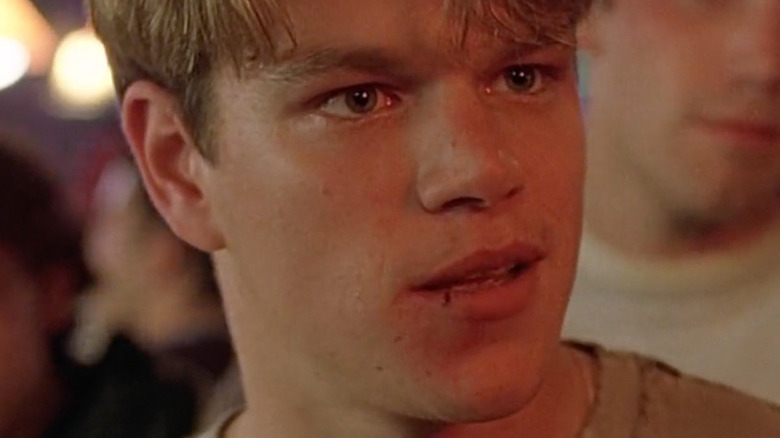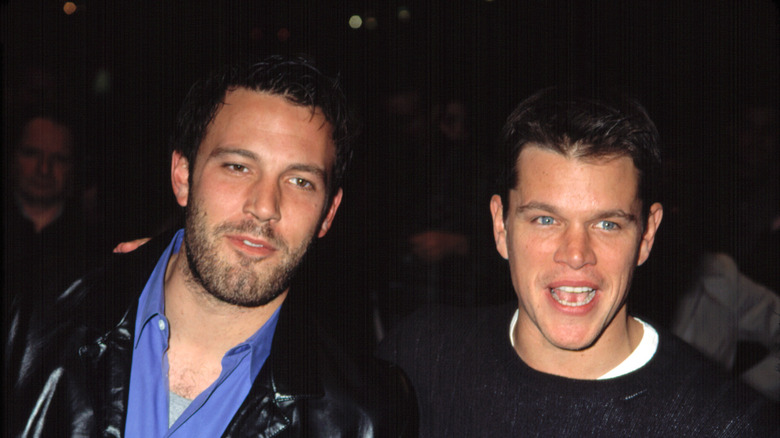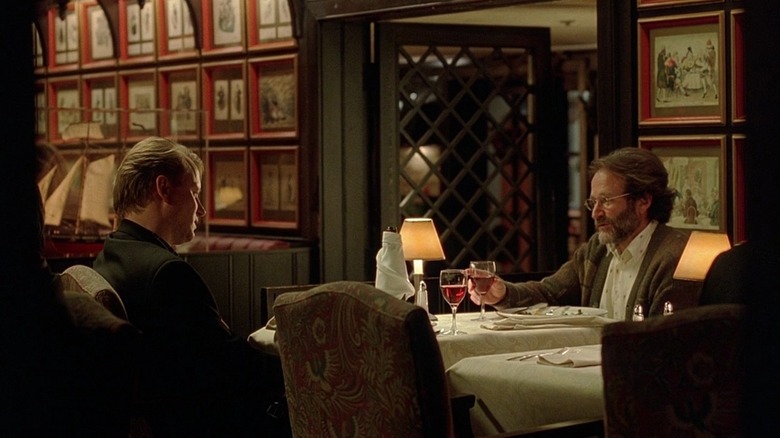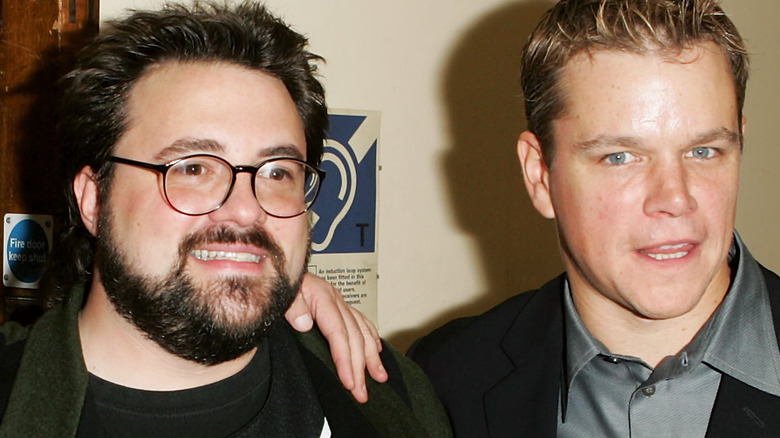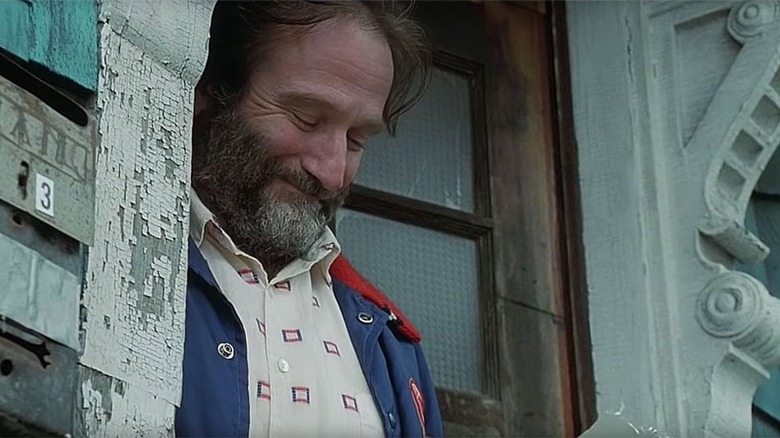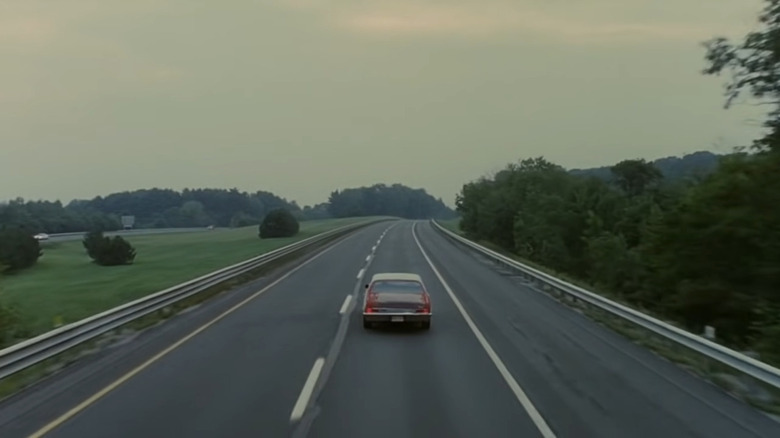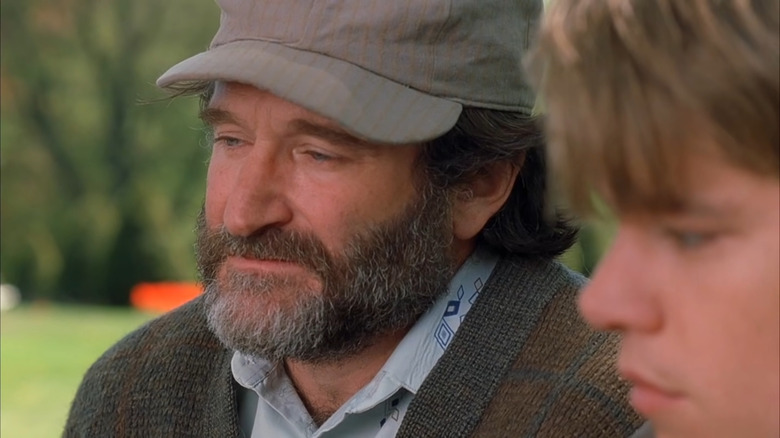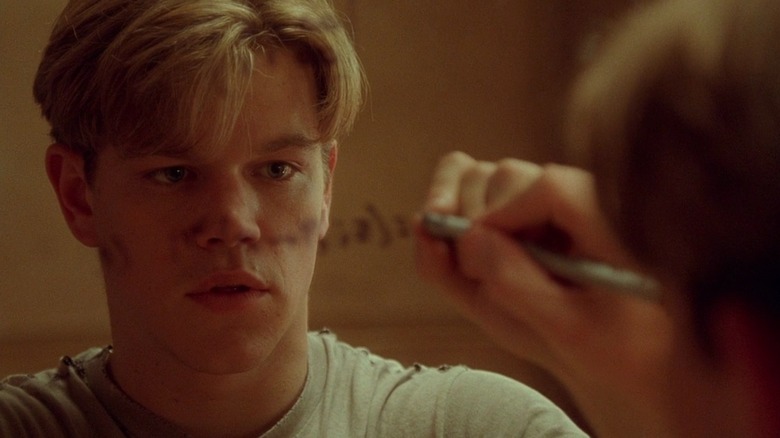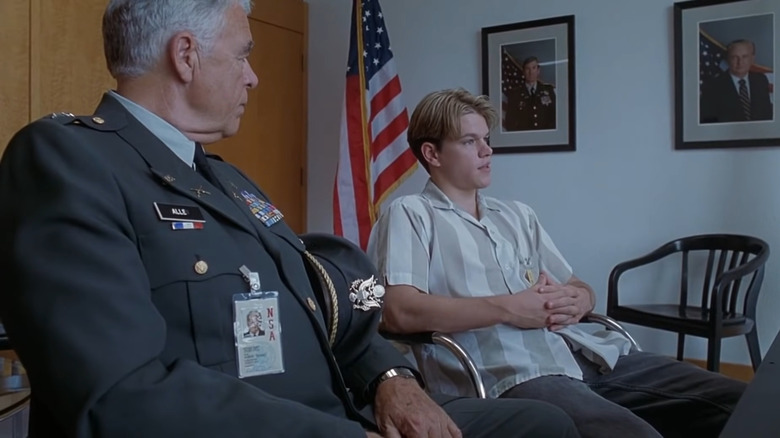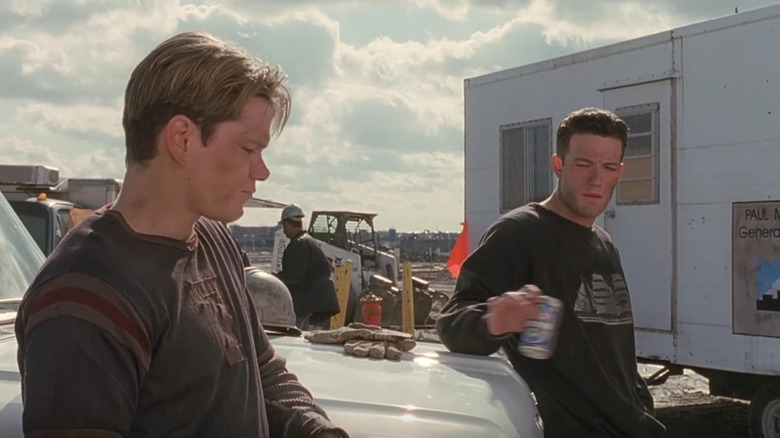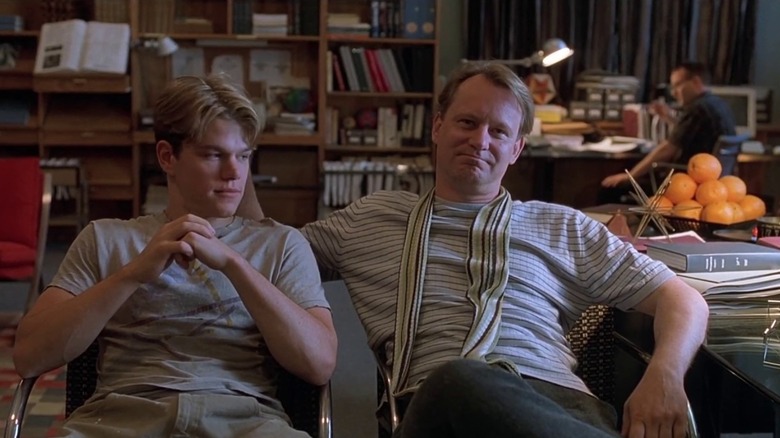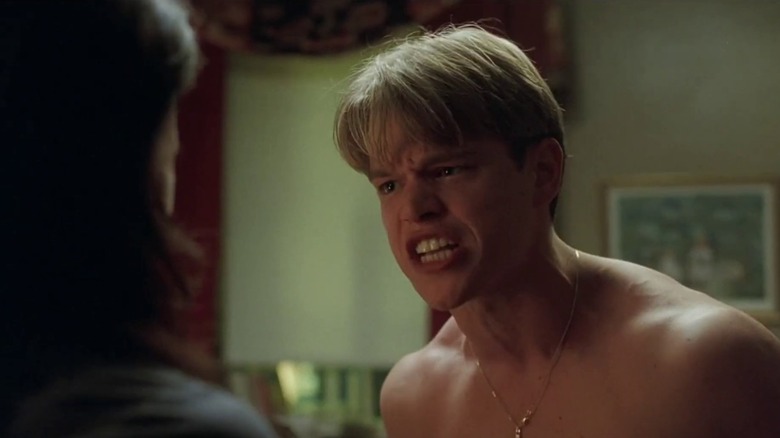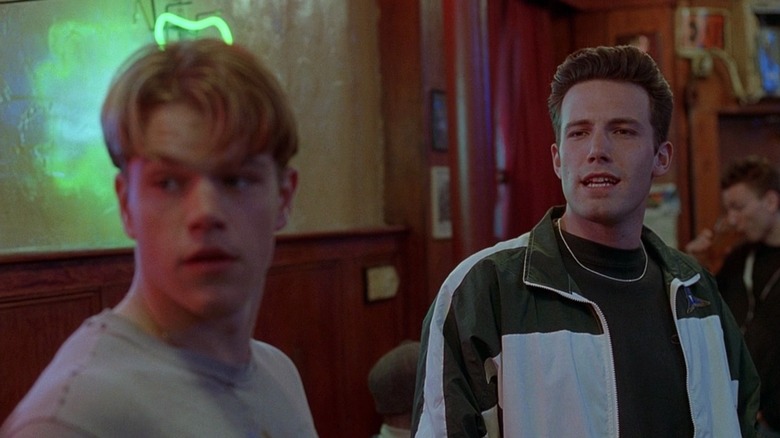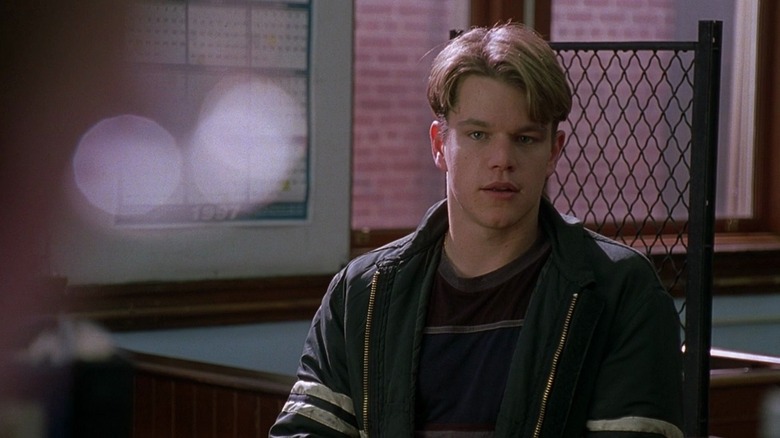The Untold Truth Of Good Will Hunting
Hollywood in the '90s was a very different place than it is today. Franchises were far from the norm, and the box office offered more than endless reboots and sequels. Studios were always on the lookout for promising original scripts. One such screenplay eventually became 1997's "Good Will Hunting," which made healthy profits and drew great critical acclaim.
"Good Will Hunting" tells the story of the titular character (Matt Damon), a talented young man whose past trauma is preventing him from living up to his potential. Will's life changes thanks to the help he gets from his friends, as well as the guidance provided to him by his court-appointed psychiatrist (Robin Williams). The relationship between the two characters defines the rest of the movie and changes Will's path in life as he finally starts to get his act together.
While the movie is great on its own, the story behind its making is possibly even more fascinating. Charting the path of "Good Will Hunting" from conception to its eventual release is a good case study in the way Hollywood used to operate before studios started relying so much on franchises and established IPs. Here are some facts about the making of "Good Will Hunting" that fans will find enlightening.
Good Will Hunting was born out of frustration
The most remarkable thing about "Good Will Hunting" is that it was conceptualized and written by its two leads, Matt Damon and Ben Affleck. The idea that these handsome, aspiring movie stars also had the brains to write a movie that got them an Oscar for best original screenplay is a source of great admiration among fans.
However, Damon and Affleck didn't write "Good Will Hunting" because they were just dying to type out a screenplay. Instead, they were jobbing actors annoyed with the lack of good roles being offered. "The script [for Good Will Hunting], really, was born out of frustration with our unemployment," Damon revealed in an interview with Today. "So we just wrote it pretty much out of desperation."
Fortunately for them, Damon already had the beginning of a promising screenplay he'd started writing during college. "I started [the script for 'Good Will Hunting'] as a one-act play in college for a class, and it was an assignment," Damon revealed in the same interview. "And that's why I did it. And the teacher really encouraged me to keep going."
The secret dirty joke
After a few years of intense work, Matt Damon and Ben Affleck finally ironed out the script for "Good Will Hunting." That was when the actual work began of shopping the script around Hollywood in hopes of landing a producer. Thanks to some canny publicity from their agent, news soon got around Hollywood that Damon and Affleck were sitting on a promising script.
After that a bidding war ensued over the rights to the script. Damon and Affleck were less concerned with selling the screenplay to the highest bidder and more with ensuring that they would be allowed to play the lead roles in the film whenever it got made. Castle Rock studios bought the rights to "Good Will Hunting" but didn't see eye-to-eye with Damon and Affleck over how to turn the script into a movie.
The studio allowed the young actors to show the script to other studios. So in order to test whether the studio heads had actually read the script, Damon and Affleck inserted a scene in the middle of the narrative where two professors — most likely the ones played by Robin Williams and Stellan Skarsgård — suddenly decide to have sex. Only the head of Miramax studios, Harvey Weinstein (yeah, that Weinstein), noticed the unexpectedly graphic scene that seemed to come out of nowhere. And so Damon and Affleck sold the rights to their script to Miramax.
Many directors were in the running
After Miramax came on board to produce "Good Will Hunting," the process began of finding a director who could bring the script to the big screen effectively. By then, word had already gotten around that the studio had high hopes for "Good Will Hunting," and many prominent filmmakers became interested in the project.
One guy who saw the script early on was Ben Stiller. He'd already made a name for himself as a writer, actor, producer and director at the time. But Stiller revealed in an interview (via Patch) that he didn't like the idea of casting two unknown actors from Boston in the film just because they wrote the script, and so he passed on the project. One director who got a lot closer to making the movie was Michael Mann, who screen-tested Matt Damon and Ben Affleck in their roles.
Unfortunately, Mann did not see eye-to-eye with Damon and Affleck over the tone of the film. Rapidly running out of options, hope arrived in the form of filmmaker Kevin Smith. Although deeply impressed with the script, Smith didn't feel he was the right person to direct "Good Will Hunting." But he personally talked to Miramax and helped convince them to allow Damon and Affleck to play the leads in the film. With Smith's support, the two young actors were allowed to choose Gus Van Sant as the director, and the rest is history.
Robin Williams improvised a lot of his scenes
While the rest of the cast put in solid performances in "Good Will Hunting," it's Robin Williams' turn as Will's psychiatrist and eventual friend Dr. Sean Maguire that truly elevates the movie to new levels. Williams was universally praised and awarded with an Oscar for his warm and empathetic take on Maguire.
The actor's ability to pull off such a serious role was also quite surprising at the time since he was best known for his comedy performances and improv-heavy stand-up routines. Williams brought that same energy to the sets of "Good Will Hunting." He would throw out improvised lines to keep the scenes fresh, like during the therapy scene where Sean is telling Will about how his wife used to fart in her sleep.
The unexpected dialog from Williams left co-star Matt Damon laughing uncontrollably and genuinely. Even the crew was laughing so hard the camera was shaking. But Williams saved his best improvisation for last. In the film's final scene, Sean was supposed to silently read a letter Will had written to him about going out of town to reunite with his girlfriend, where Will references the doctor's earlier quote of going to "see about a girl." Instead of keeping quiet, Williams choose to smile wryly and ad lib the now-iconic words, "Son of a b****. He stole my line."
Terrence Malick suggested the ending
When you think about the vibe and tone of "Good Will Hunting," it doesn't exactly feel like a Terrence Malick movie. The director of "The Thin Red Line," "The Tree of Life," and "Badlands" likes to make meditative features with deep philosophical and spiritual overtones. Compare that to the brash, in-your-face style of "Good Will Hunting," where fights break out with little provocation and swear words are used liberally by all the characters. And yet Malick had a pretty significant hand in making "Good Will Hunting" what it was.
Specifically, he was responsible for the ending that made it into the final cut. Matt Damon revealed in an interview with journalist Tom Shone (via /Film) that the film originally ended with Will and his girlfriend, Skylar (Minnie Driver), leaving in his car together. Ben Affleck knew Malick through the former's godfather, and Malick agreed to have dinner with Affleck and Damon to discuss the script for their movie. Halfway through the dinner, Malick said, "I think it would be better if [Skylar] left, and [Will] went after her." Malick's suggestion was based on Italian cinema, which often ended with the hero leaving town alone. Damon and Affleck immediately knew that Malick was right, and so they changed the ending to show Will leaving alone in search of Skylar.
The park scene was anything but private
One of the best scenes in "Good Will Hunting" comes soon after Sean and Will's first meeting. In his usual arrogant manner, Will tries to belittle and humiliate Sean. In response, Sean takes Will to a public park. Sitting together on a bench in the deserted park, Sean uses mere words to calmly and efficiently dismantle all of Will's arrogant posturing to reveal the scared little boy underneath.
Among the things that make the scene so powerful is the complete silence surrounding the two characters. But shooting the scene was anything but quiet. Minnie Driver recalled that people in the park gathered rapidly near the bench once they heard Robin Williams was in the neighborhood. And the actor himself couldn't resist putting on a show for the sake of his fans right in the middle of the very serious moment.
"You could see people coming along, running down into the park, telling other people, 'Come, come down in the park.'" Driver told Justin Long on his "Life Is Short" podcast (via Pajiba). "And suddenly, [Williams] had this crowd, and they put him on an apple box. He just did his thing for like 45 minutes." That impromptu moment of joy and laughter turned bittersweet after Williams' death, when the bench in the park was turned into a memorial site for the late actor.
Will was almost a physics savant
The central conflict in "Good Will Hunting" arises from the fact that the titular character's childhood trauma is preventing him from realizing his potential as one of the greatest mathematicians in history. Naturally, we get to see Will solving math theorems from time to time. But Will almost became a physics nerd instead.
In an early draft of the script that Matt Damon wrote while studying at Harvard, Will was set up as having a highly advanced grasp of physics. According to an MIT interview (via ABC News), when Damon ran his script past Harvard professor Sheldon Glashow, a Nobel Prize-winning physicist, the latter suggested that it would be more useful for the story to make Will into a math prodigy.
The change makes sense. While solving mathematical equations can be pursued in isolation, as Will is shown to have done his whole life, studying physics is a much more collaborative experience that would have required him to attend some sort of class instead of just reading books in the library. Apart from making the initial suggestion, Glashow also called in his brother-in-law, MIT professor Daniel Kleitman, to help create the theorems and formulae shown in "Good Will Hunting."
Good Will Hunting was almost an action thriller
When Matt Damon and Ben Affleck first started collaborating on "Good Will Hunting," their dream was to use the opportunity to showcase their acting abilities and leading-man potential in the best possible manner. And so the initial plans for their movie were a lot more ambitious than a small coming-of-age film about a troubled genius.
In fact, Damon and Affleck wanted to push the story in a far more action-thriller direction at the start. "We came up with this idea of the brilliant kid and his townie friends, where he was special and the government wanted to get their mitts on him," Ben Affleck revealed to Boston Magazine. "And it had a very 'Beverly Hills Cop,' 'Midnight Run' sensibility, where the kids from Boston were giving the NSA the slip all the time." Fortunately, director Rob Reiner at Castle Rock studios read that draft of the script and recognized that it had two stories competing for attention — the action-thriller and the emotional drama about a character learning to let go of his past trauma.
Damon and Affleck realized the truth of Reiner's advice that one of the stories needed to go. So they reworked "Good Will Hunting" into the film that eventually showed up on the big screen. Later, Damon got to play out the storyline about being chased by the government when he did the "Jason Bourne" movies.
Ben Affleck suffered due to playing Chuckie
While the movie is named after William Hunting, "Good Will Hunting" is also about the community of people who surround the titular character and influence his life's decisions. An important role in the movie is that of Chuckie (Ben Affleck), Will's best and most loyal friend who genuinely wants his buddy to achieve the great things he's capable of.
In one of the best scenes in the movie, Chuckie admits to Will that he is jealous of his effortless genius, and he basically forces Will to stop being afraid of success, urging him to go out into the world and become as successful as possible. It's this scene that truly cements Will as the tortured young genius and Chuckie as his rather dim-witted but well-meaning blue-collar friend.
Unfortunately that aspect of the role also became how audiences began to view Affleck himself. "I've had people say 'Wow, you're pretty smart,'" the actor admitted in an interview with Boston Magazine, "as if they expected this real sort of dummy, a guy who was even less intelligent than Chuckie." Fortunately, Affleck's Oscar-winning success as a writer and director later in his career effectively put those assumptions to rest.
The clothing worn by Lambeau raised some eyebrows
All through "Good Will Hunting," the titular character is pulled in opposite directions by the two older male figures who are trying to show him how he should live his life. Sean Maguire is the empathetic mentor who understands that it's more important for Will to take care of his emotional health than chase monetary goals. On the other hand, Professor Gerald Lambeau (Stellan Skarsgård) only sees Will's mental prowess and keeps pushing him to realize his potential as a mathematician.
Lambeau is not presented as a villain but the polar opposite of Sean. This difference extends to their clothing. While Sean prefers comfortable jackets and sweaters, Lambeau chooses more stylish clothing — particularly a scarf that was mocked by some critics as a pretentious addition to his wardrobe.
But Skarsgård stands by the look for Lambeau, even the scarf, as a way of making the character more of an academic rock star than a nerd. "The first thing I said [while deciding Lambeau's look] was, 'I'm a college professor — no tweed,'" the actor explained to Moviefone (via Stellanonline.com). "That was a condition because I wanted a rock and roll professor more than a tweed professor. I want a professor that f***** his students. And I got it!"
Casting Matt Damon was an uphill battle
What made getting "Good Will Hunting" into production so difficult was not just the fact that it had been written by a couple of unknown writers but also that those writers wanted to play the lead roles in the film. This kind of thing didn't happen a lot in Hollywood, with rare exceptions like "Rocky," where Sylvester Stallone had a similar deal.
While Matt Damon and Ben Affleck had played a few supporting roles in other films at that point, nothing on their resume indicated that they could carry a film and make people come to the theaters. As the film's director Gus Van Sant explained, the fact that Damon and Affleck wanted to play the leads was scaring producers off investing in the movie. "Matt and Ben were starring in ['Good Will Hunting']," the filmmaker told The Talks, "and all these [studio people] were like, 'Yeah, but if it was Leo [DiCaprio] and Brad [Pitt] it would be better.'"
What ultimately helped convinced Miramax that Damon could shoulder the burden of headlining the movie was him getting cast in Francis Ford Coppola's legal drama "The Rainmaker" in the lead role. According to a report by Vanity Fair, the fact that Coppola saw potential in Damon is what finally convinced Miramax to push "Good Will Hunting" into production with Damon in the lead role.
The title was borrowed from another script
Aside from its excellent performances and writing, another reason "Good Will Hunting" is so memorable is because of its unusual title. But it turns out the title of the movie wasn't something that either Matt Damon or Ben Affleck came up with.
"The title is written not by either of us but by a friend of ours named Derrick Bridgeman," Affleck told Boston Magazine, admitting that they "couldn't come up with a title." The actor went on to reveal that they still lacked a title for their script when it was time to start shopping it around to Hollywood studios. At that time, Bridgeman had "written a script of his own called 'Good Will Hunting' about a Black kid in Roxbury."
Struck by the arresting title, Damon and Affleck offered Bridgeman $10,000 if they could sell their script to a studio using his movie title. The arrangement was agreed upon, and one of the first things Damon and Affleck did after selling their script was cut Bridgeman his check. He also secured a bit part in the movie, playing the role of an MIT student who gets to ask Gerald Lambeau a question in class.
Matt Damon agrees his hairstyle was terrible
The '90s was a very different time in terms of fashion and what was deemed cool. "The Matrix" might make it look like everyone in that era marched around wearing black leather overcoats and sunglasses, but general fashion trended a lot more towards eye-grabbing color and pop-bubblegum clothing styles.
"Good Will Hunting" does a good job of keeping to the fashion trends of its time in a low-key way. But that's what makes Matt Damon's hairstyle in the movie all the more jarring. The actor sports a golden bowl cut with frosted tips, better suited to one of the Backstreet Boys than a surly, low-income genius. In later years, Damon admitted that his choice of hair for the movie left a lot to be desired, and he placed the blame squarely on his own shoulders.
"That [hairstyle] is so my fault," Damon told Vulture. "For whatever reason at that age, I loved that haircut." According to the actor, everyone from the director to Ben Affleck expressed doubts about his hair, but Damon stuck to his guns, later lamenting, "I don't know what my problem was. I looked like I should be singing backup for Color Me Badd."
